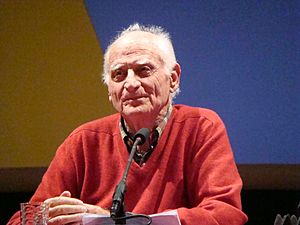Michel Serres facts for kids
Quick facts for kids
Michel Serres
|
|
|---|---|

Michel Serres in Rennes, February 2011
|
|
| Born | 1 September 1930 |
| Died | 1 June 2019 (aged 88) |
| Alma mater | École Navale École Normale Supérieure University of Paris |
| Era | Contemporary philosophy |
| Region | Western philosophy |
| School | Continental philosophy French epistemology |
| Institutions | University of Paris I Stanford University |
|
Main interests
|
Epistemology Philosophy of science |
|
Notable ideas
|
Hermes, the messenger of the gods, as standing for the communication that takes place between science and the arts |
|
Influences
|
|
|
Influenced
|
|
Michel Serres (French: [sɛʁ]; 1 September 1930 – 1 June 2019) was a French philosopher, theorist and writer. His works explore themes of science, time and death, and later incorporated prose.
Life and career
The son of a bargeman, Serres entered France's naval academy, the École Navale, in 1949 and the École Normale Supérieure in 1952. He aggregated in 1955, having studied philosophy. He spent the next few years as a naval officer before finally receiving his doctorate (doctorat ès lettres) in 1968 from the University of Paris (with a thesis titled Le Système de Leibniz et ses modèles mathématiques), and began teaching in 1969 at the University of Paris I.
As a child, Serres witnessed firsthand the violence and devastation of war. These formative experiences led him consistently to eschew scholarship based upon models of war, suspicion, and criticism.
Over the next twenty years, Serres earned a reputation as a spell-binding lecturer and as the author of remarkably beautiful and enigmatic prose so reliant on the sonorities of French that it is considered practically untranslatable. He took as his subjects such diverse topics as the mythical Northwest Passage, the concept of the parasite, and the explosion of the Space Shuttle Challenger. More generally Serres was interested in developing a philosophy of science which does not rely on a metalanguage in which a single account of science is privileged and regarded as accurate. To do this he relied on the concept of translation between accounts rather than settling on one as authoritative. For this reason Serres has relied on the figure of Hermes (in his earlier works) and angels (in more recent studies) as messengers who translate (or map) back and forth between domains (i.e., between maps).
In 1990, Serres was elected to the Académie française, in recognition of his position as one of France's most prominent intellectuals. He was an influence on intellectuals such as Bruno Latour, Robert Pogue Harrison, and Jonathan Bate. He served as a Professor of French at Stanford University.
His most enduring book is Le contrat naturel (1990), a highly prescient work addressing the need for philosophy to address the climate crisis.
In an interview with Hans Ulrich Obrist, Serres expressed interest in the emergence of a new political philosophy that addresses the digital context of the 21st century, "I think that out of this place of no law that is the Internet there will soon emerge a new law, completely different from that which organized our old metric space."
Serres was a vocal enthusiast for freely accessible knowledge, especially Wikipedia.
In 2012, Serres was awarded the Meister Eckhart Prize and in 2013 he was awarded the Dan David Prize. He died on 1 June 2019, at the age of 88.
See also
 In Spanish: Michel Serres para niños
In Spanish: Michel Serres para niños

